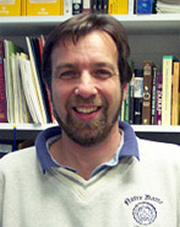
An innovative new University of Notre Dame program called Global Linkages of Biology, the Environment and Society (GLOBES) will enable researchers to use an interdisciplinary approach in seeking solutions to pressing problems in human and global health.
The Colleges of Science and Artsand Letters have been awarded a five-year, $3.2 million Integrative Graduate Education and Research Training grant (IGERT) from the National Science Foundation (NSF) to fund the program. The grant is the first of its kind received by the University.
GLOBES will integrate research and teaching activities among the Universitys faculty in the Colleges of Science and Arts and Letters and theLawSchool. TheReillyCenterfor Science, Technology and Values, Kroc Institute for International Peace Studies, Kellogg Institute for International Studies and Center for Social Concerns also will be involved in the program.
The goals of the Notre Dame GLOBES program are two-fold,said Jeffrey Feder, associate professor of biological sciences and director of the program.First, GLOBES will cut across traditional academic boundaries at the University, harnessing the collective skills of Notre Dame faculty in a team-based approach to address important world problems.
Secondly, GLOBES will provide the next generation of Notre Dame graduate and undergraduate students with knowledge, technical tools and experience to combat world challenges in socially responsible and ethically sound ways.
Key features of the GLOBES program include field research projects organizing students and faculty into teams investigating interrelated issues of environmental degradation, the spread of infectious diseases, and invasive species at sites in North America,China, West Africa andBali. The program also will feature new interdisciplinary courses and seminars and intensive training modules that give students practical, hands-on experience with techniques ranging from genomics to ethical and economic analyses. Students also will receive training on campus and inWashington,D.C., to hone their teaching, communication, policy and leadership skills.
The NSF IGERT Award recognizes Notre Dames potential to integrate socially relevant teaching, research and outreach services across the biological and social sciences. Only 26 other institutions received such grants in a nationwide competition of more than 550 proposals.
The National Science Foundation has made an outstanding investment to initiate the GLOBES program at Notre Dame,University Provost Thomas G. Burish said.Problems of the 21 st century are inherently complex and multifaceted. They do not yield to optimal solution by single disciplines. The leaders who will solve these problems need to be both highly competent within disciplines and cognizant of critical biological, social, economic, legal, ethical and moral considerations when cutting across fields.
GLOBES will provide the framework for Notre Dame students to develop the requisite disciplinary expertise they need to contribute to their chosen professions, while simultaneously learning to work in multi-disciplinary, faculty mentored teams focused on real world problem solving. The insights generated about the problems at hand, coupled with the skills and attitudes developed to be effective team players and leaders, will serve our students and the world well throughout their careers.
GLOBES will emulate the successful corporate, team-based model of problem solving by facilitating the formation of rapid response working teams of Notre Dame faculty and students to attack specific human and environmental health issues.
GLOBES will integrate the graduate program with research and undergraduate education activities across the University,said Jeffrey Kantor,GraduateSchoolvice president.GLOBES will provide new education experiences and open a myriad of new career opportunities for our students, while exposing them to the realities of addressing critical environmental and health problems with their boots in the field.
The GLOBES program is distinctive because academic boundaries loom large at most universities, stifling interactions among relevant disciplines and impeding innovative, team-based problem solving.
The Notre Dame family is different from most universities,said Chris Maziar, vice president and associate provost.The close interpersonal relationships of our faculty and administration, working together with our shared purpose of mission, make it possible to build strong working partnerships to readily create programs like GLOBES which are acutely difficult at other leading institutions of higher learning.
Despite his enthusiasm for the new program, Feder realizes that tackling pressing problems in human and global health is a formidable challenge.
The environmental challenges facing the world are immense and daunting,he said.And, training the next generation of students to solve global problems is a weighty responsibility. However, by galvanizing the skills of biologists, social scientists, students and religious and community leaders to alleviate human suffering and build an informed society, Notre Dame is offering real hope for the future.
* Contact: * _Jeffrey L. Feder, associate professor of biological sciences, 574-631-4159, feder.2@nd.edu _
TopicID: 14183